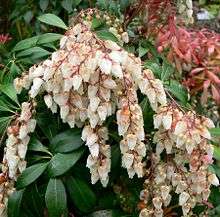馬酔木
Japanese

Etymology 1
| Kanji in this term | ||
|---|---|---|
| 馬 | 酔 | 木 |
| Grade: 2 | Grade: S | Grade: 1 |
| jukujikun | ||
The original kun'yomi pronunciation of this word was ashibi, now considered a variant reading.
The leaves of the plant were known to intoxicate horses when eaten, causing horses to stumble and become weak in the legs. As such, this word is most likely a contraction of 足癈 (ashijihi, “numbness in the feet/legs”).
The kanji 馬酔木 are an example of jukujikun, meaning literally horse intoxicating tree.
Noun
馬酔木 (hiragana あしび, rōmaji ashibi) (variant)
馬酔木 (hiragana あしみ, rōmaji ashimi) (variant)
馬酔木 (hiragana あせみ, rōmaji asemi) (variant)
馬酔木 (hiragana あせも, rōmaji asemo) (variant)
馬酔木 (hiragana あせぼ, rōmaji asebo) (variant)
馬酔木 (hiragana あせぶ, rōmaji asebu) (variant)
馬酔木 (hiragana あせび, katakana アセビ, rōmaji asebi) (standard)
- Pieris japonica: Japanese andromeda, a flowering shrub native to Japan
See also


Etymology 2
| Kanji in this term | ||
|---|---|---|
| 馬 | 酔 | 木 |
| ば Grade: 2 |
すい Grade: S |
ぼく Grade: 1 |
| on’yomi | ||
The on'yomi of the kanji spelling 馬酔木.
Noun
馬酔木 (hiragana ばすいぼく, rōmaji basuiboku)
- Pieris japonica: Japanese andromeda, a flowering shrub native to Japan